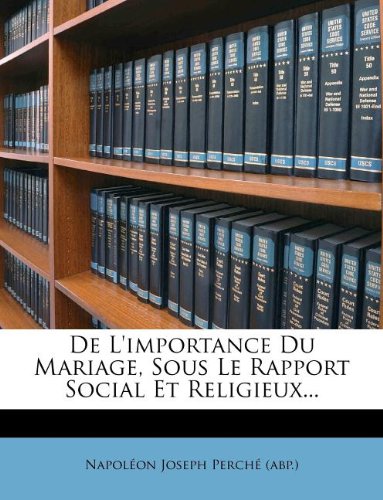Background
Napoleon Joseph Perche was born on January 10, 1805 in Angers, Maine-et-Loire, France. A precocious child, he could read at four.



(This is a reproduction of a book published before 1923. T...)
This is a reproduction of a book published before 1923. This book may have occasional imperfections such as missing or blurred pages, poor pictures, errant marks, etc. that were either part of the original artifact, or were introduced by the scanning process. We believe this work is culturally important, and despite the imperfections, have elected to bring it back into print as part of our continuing commitment to the preservation of printed works worldwide. We appreciate your understanding of the imperfections in the preservation process, and hope you enjoy this valuable book. ++++ The below data was compiled from various identification fields in the bibliographic record of this title. This data is provided as an additional tool in helping to ensure edition identification: ++++ De L'importance Du Mariage, Sous Le Rapport Social Et Religieux Napoléon Joseph Perché (abp.) Imprimé par H. Méridier, 1846 Religion; Christian Life; Love & Marriage; Family & Relationships / Marriage; Marriage; Religion / Christian Life / Love & Marriage
https://www.amazon.com/Limportance-Mariage-Rapport-Social-Religieux/dp/1247636771?SubscriptionId=AKIAJRRWTH346WSPOAFQ&tag=prabook-20&linkCode=sp1&camp=2025&creative=165953&creativeASIN=1247636771
Napoleon Joseph Perche was born on January 10, 1805 in Angers, Maine-et-Loire, France. A precocious child, he could read at four.
Napoleon Joseph Perche graduated from the Seminary of Beaupréau.
At eighteen, Napoleon Joseph Perche was a professor of philosophy; and at twenty-four he was ordained a priest. He served in various pastorates in France until 1837, when he went to America to assist Benedict J. Flaget, bishop of Bardstown, Kentucky, in his missionary work at Portland. Wishing to raise money to build a church for his parishioners, who were poor, he secured permission to go to New Orleans. There, in the St. Louis Cathedral, he preached such eloquent sermons in French that the Creoles soon subscribed the money he needed, and the Archbishop, Antoine Blanc, offered him an appointment. Perché, however, asked to be allowed first to go back to Kentucky and finish his church. This work accomplished, he returned to New Orleans, and, in 1842, became almoner of the Ursuline Convent, a post he filled for twenty-eight years.
In 1842 began the long drawn-out controversy between Blanc and the wardens of the St. Louis Cathedral over the right to appoint the curate. It became so bitter that it was taken to the courts and the wardens retained the three leading lawyers of the city: Soulé, Roselius, and Mazureau, to represent their side. In order to mobilize public opinion in favor of his church's stand, Perché founded a French weekly called Le Propagateur Catholique, which made its initial appearance on November 12, 1842. Although it contained an announcement that it was "published by a society of literary men, " Perché himself did most of the writing and struck some doughty blows in defense of his ecclesiastical superior, Archbishop Blanc, whose cause was eventually sustained in the supreme court. The good Abbé was a fearless fighter, and his editorials were so vehemently partizan and pugnacious that they lacked the calm judicial quality which might have been expected of his cloth.
Napoleon Joseph Perche continued, nevertheless, to edit the paper successfully until, in 1857, he resigned on account of his health. Pope Leo XIII called him the "Bossuet of the American church" on account of his services as a propagandist. In 1870 Pope Pius IX appointed him coadjutor to Archbishop John Mary Odin. At Odin's death in 1870 Perché became the third archbishop of New Orleans. He introduced the Carmelite Order of nuns into the diocese, and in 1872 inaugurated an annual service of thanksgiving for victory at the battle of New Orieans on January 8, 1815. Some of his articles from the Propagateur Catholique were reprinted in a small pamphlet entitled De l'Importance du Marriage sous le rapport social et religieux (1846). This and a few pastoral letters constitute his literary remains.
Napoleon Joseph Perche died in New Orleans on December 27, 1883.
(This is a reproduction of a book published before 1923. T...)
